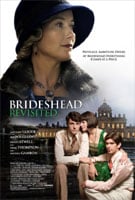Like Atonement before it, Brideshead Revisited is one of those astoundingly well-acted literary adaptations that fans of the novel will eat up like Thanksgiving dinner and first timers will likely consider a solid replacement for sleeping pills. This condensed version of Brideshead gives audiences a hyper-dramatic rendition of the book by Evelyn Waugh (a man by the way), where everyone is little more ambitious, more religious, more passionate and more gay, which helps with the pacing of the story but ultimately fails to capture the heart of Waugh’s sardonic tale.
Set in England at the dawn of the Second World War, the film circles around Charles Ryder (Matthew Goode), a young middle class painter who befriends the charmingly quirky Lord Sebastian Flyte (Ben Whishaw) during their tenure at Oxford. The writers of the film make Sebastian’s interest in Charles overtly sexual, whereas the novel left their “man-love” completely ambiguous. Nevertheless, their budding friendship is challenged once Sebastian brings Charles home to his sprawling estate at Brideshead, where Charles meets the devout Lady Marchmain (Emma Thompson), an expert in Catholic guilt, and Sebastian’s jaded sister Julia (Hayley Atwell). Drawn both to Julia and to the luxury of Brideshead, Charles’ desire to become closer to the family only distances him from Sebastian, who in Charles saw an escape from the oppressive Catholic lifestyle Lady Marchmain demands. As Charles’ decisions send Sebastian into an alcoholic tailspin, he learns just how deep Lady Marchmain’s hold over her children runs.
The film’s strengths lie in the stunning performances by all the actors, with Emma Thompson leading the pack thanks to her surprisingly human portrayal of the villainess. Meanwhile Ben Whishaw’s Sebastian is much more flamboyant than he was written in the novel, and yet Whishaw makes it easier to understand and to sympathize with Sebastian’s behavior. Atwell’s Julia is also quite engaging, but perhaps too romanticized as we don’t see her transform from the caustic social climber who wouldn’t give Charles the time of day, to the reformed and repentant woman who falls for him ten years later. Mathew Goode does well with the leading role, but the character is so passive that at times he feels a bit dull to watch.
The actors combine with the impressive set-design and costumes to perfectly recreate 1940’s high society, but the more dramatized plot-line leaves Waugh’s underlying cynicism at bay. Though there is some prime comic relief provided by Charles’ sarcastic father (played by Patrick Malahide) and the painfully dull Bridey (Ed Stoppard), the tragic exploration of the Catholic faith is disappointingly overlooked so that the end feels abrupt as opposed to poignant. The main issue is that the writers tried to make Brideshead a romance alla Pride and Prejudice and forgot that they weren’t adapting Austen but a Catholic convert for whom love played second fiddle to grace. What results is a film with all the elements of a drama that never quite comes together to make us feel all the emotions we crave after dedicating over two hours of our time.
Ultimately Waugh-purists ought to set aside a weekend to take on the Emmy and Golden Globe winning 1981 miniseries starring Jeremy Irons, but others who long to revisit Brideshead will be pleased if not overwhelmed by the amazing costumes, beautiful set-pieces and worthy cast in this latest adaptation.











